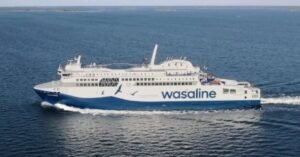Wasaline Launches First Carbon-Neutral Shipping Route in the Baltic
Finland’s Wasaline is set to make history by operating the first carbon-neutral shipping route in the Baltic region, achieving a significant milestone towards the company’s sustainability goals for the year 2030.
As part of their commitment to environmental conservation, Wasaline has entered into strategic partnerships with Gasum for biogas supply and Stena Line for the FuelEU Maritime pooling agreement. These collaborations will enable Wasaline’s vessel, Aurora Botnia, to run on biofuel and battery power, paving the way for a greener future in maritime transportation.
Peter Ståhlberg, the Managing Director of Wasaline, expressed his enthusiasm for this groundbreaking initiative, stating that the collaboration with Stena Line and Gasum positions Wasaline as a leader in carbon-neutral shipping, setting a new standard for the industry.
Notably, all cargo and passengers traveling with Wasaline will now enjoy sustainable transport without incurring any additional charges for carbon neutrality.
Key Features of the Carbon-Neutral Shipping Route:
- Operates between Vassa Port, Finland, and Umea, Sweden
- Utilizes certified biogas for daily operations
- Recognized as the first international green shipping corridor in operation by DNV
- Reduces greenhouse gas emissions with Gasum’s bio-LNG, a fully renewable fuel
Gasum’s bio-LNG is derived from biowaste, manure, sewage sludge, and various industrial and agricultural by-products, offering a sustainable alternative to traditional fossil fuels.
The Aurora Botnia, a 24,300 gross ton vessel with a length of 150 meters, boasts impressive features such as a freight capacity of 1500 lane meters for cars and trucks, accommodation for 935 passengers, and dual-fuel Wartsila engines that can run on multiple fuel sources.
The vessel is equipped with a 2.4 MWh battery system, which will be upgraded to a total capacity of 12.6 MWh, making it the largest battery system on a RoPax ship. The integrated Wartsila energy management system enables seamless transitions between fuel and battery modes, allowing for fully electric low-speed transits and manoeuvring.
Niclas Mårtensson, CEO of Stena Line, emphasized the significance of integrating the Aurora Botnia into Stena Line’s FuelEU Maritime Pool, providing access to biogas and reducing emissions across the pool. This collaboration not only lowers fuel costs but also strengthens the strategic positioning of both companies in the evolving biofuel market.
The partnership between Wasaline, Stena Line, and Gasum marks a significant milestone in the maritime industry, showcasing a sustainable model for future operations and inspiring other companies to embrace eco-friendly practices.

